|
Thursday, Jan. 24
1 p.m.
Physics and Detector Seminar - West Wing, WH-10NW
Speaker: U. Nauenberg, University of Colorado, Boulder
Title: Effectiveness of the BeamCal in Observing the Two-Photon Process
2:30 p.m.
Theoretical Physics Seminar - Curia II
Speaker: K. Choi, Korea Advanced Institute of Science and Technology
Title: Moduli Stabilization and the Pattern of Sparticle Masses
3:30 p.m.
DIRECTOR'S COFFEE BREAK - 2nd Flr X-Over
4 p.m.
Accelerator Physics and Technology Seminar - One West
Speaker: V. Lebedev, Fermilab
Title: Improvements in Antiproton Cooling and Stacking
Friday, Jan. 25
8:40 a.m. - 8 p.m.
2nd Workshop on Physics for Project X - One West
12 p.m.
Wellness Works Brown Bag Seminar - Curia II
Speaker: J.P. Harley, Ph.D.
Title: Musings on Spencer Johnson's Book "Who Moved My Cheese?"
THERE WILL BE NO DIRECTOR'S COFFEE BREAK TODAY
4 p.m.
Joint Experimental-Theoretical Physics Seminar - One West
Speaker: W. Marciano, Brookhaven National Laboratory
Title: Frontier Physics at a High Intensity Proton Facility
Saturday, Jan. 26
8:30 a.m. - noon
2nd Workshop on Physics for Project X - One West
Click here for NALCAL,
a weekly calendar with links to additional information.
|
Thursday, Jan. 24
- Southwestern chicken tortilla
- Philly style cheese steak
- *Garlic herb roasted pork
- Mediterranean chicken packages
- Southwestern turkey wrap
- Assorted slice pizza
- *Marinated grilled chicken Caesar salads
*Carb restricted alternative
Wilson Hall Cafe menu |
|
Thursday, Jan. 24
Dinner
- Coquille St. Jacques
- Grilled duck breast
w/lingonberry wine sauce
- Roasted butternut squash
- Wild rice w/raisins
- Chocolate fondue w/fresh fruit
Wednesday, Jan. 30
Lunch
- Chicken curry
- Steamed jasmine rice
- Sautéed vegetables
- Coconut flan
Chez Leon menu
Call x4598 to make your reservation. |
|
|
Oddone to meet today with divisions, sections
Meetings will discuss upcoming furloughs
Director Pier Oddone and senior lab managers will meet with employees of all
divisions and sections today, Jan. 24, in Ramsey Auditorium. The
one-hour meetings will provide information and respond to questions about
the rolling furlough program that will begin in February as a budget-cutting
measure.
9:30 a.m.
Accelerator Division, Technical Division, Accelerator Physics Center
11 a.m.
Computing Division, Particle Physics Division, Center for Particle Astrophysics, CMS Center
1:30 p.m.
Business Services Section, Directorate, ES&H Section, Facilities
Engineering Section, Finance Section, Workforce Development & Resources
Section
In addition to attending the meetings for their divisions and sections,
employees who are visa holders and their supervisors should also attend a
special meeting at 3:30 p.m. in Ramsey Auditorium. Employees should reserve
visa-related questions for this meeting.
Employees received packets of furlough information by campus mail Wednesday, Jan. 23. Furlough materials are available online at
http://www.fnal.gov/faw/furlough/
|
Project X second workshop to further physics plan
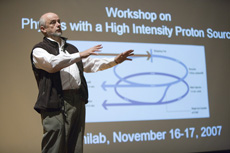
Fermilab Director Pier Oddone talks to attendees of the first Project X Physics workshop.
Project X holds exciting discovery opportunities, and this week scientists will craft them into a clear, compelling plan for Fermilab's future. More than 150 people will gather Jan. 25-26 for the second Project X Physics workshop, hosted by Fermilab and Fermilab Users Executive Committee.
"In the second workshop, we're really narrowing the focus," said Kevin Pitts, UEC chair. "The first was about the big picture, and now we'll spend more time examining the details of what an experimental physics program might potentially look like."
The first workshop, held at Fermilab in November 2007, laid the groundwork for the physics case for Project X. It drew more than 200 people from 78 institutions. Many have continued their efforts as part of separate workgroups.
"Project X has the potential to engage in a a broad range of forefront experiments covering a wide area of science," said Doug Bryman, workgroup organizer and physics professor at the University of British Columbia.
Each workgroup worked in the charge of developing an ideal respective roadmap for making discoveries in neutrino, kaon, muon and antiproton research. An overall experiment strategy will incorporate reports from each group. HEPAP's Particle Physics Project prioritization Panel will receive the strategy report at the meeting at Fermilab on Jan. 31 through Feb. 2.
"As Fermilab and the U.S. particle-physics community struggle with the FY2008 omnibus funding bill, the importance of a clear and compelling plan for the future becomes even greater," said Fermilab Deputy Director Young-Kee Kim. "Our job now is to create an excellent strategy that we can convey to P5 and the community."
Information about the workshop, working groups and registration information is available here. There is no registration fee.
|
Last piece lowered for CMS
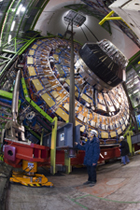 |
| Touch down. Now that the final piece is underground, final commissioning will begin on the CMS detector. Image courtesy of CERN. |
Early Tuesday morning (Jan. 22), scientists of the U.S. CMS collaboration joined colleagues around the world to celebrate the lowering of the final piece of the Compact Muon Solenoid detector into the underground collision hall at CERN in Geneva, Switzerland. The near completion of the CMS detector marks a pivotal moment for the international experiment, in preparation for the start-up of the Large Hadron Collider this summer.
Read More
|
Shattered illusions
From nature.com,
Jan. 23, 2008
Trying to follow the actions of the US Congress on research spending in 2007 was like sitting blindfolded on a rollercoaster, and when the year ended in sudden free-fall, science lobbyists were shaken and stunned, and left wondering how they were taken for a ride. The year's victories - a supplemental spending bill in the spring that unexpectedly included additional science funding; legislation in the summer pledging to double research spending over 10 years; and spending bills in the autumn with long-sought increases for the physical sciences - proved to be no harbingers of a bounty for researchers when Congress finally completed its work in December. The final budget for research as a whole for fiscal year 2008 does not keep pace with inflation.
Read more
Future of top U.S. particle physics lab in jeopardy
From Scientific American,
Jan. 22, 2008
In recent years the U.S. national laboratories have laid out an ambitious research agenda for particle physics. About 170 scientists and engineers at the Fermi National Accelerator Laboratory in Batavia, Ill., have been developing designs and technologies for the International Linear Collider, a proposed machine that would explore the frontiers of high-energy physics by smashing electrons into their antimatter counterparts. Another 80 researchers at Fermilab have been finalizing the plans for NOvA, a giant detector in northern Minnesota that could answer fundamental questions about the neutrino, a particle that is ubiquitous but maddeningly elusive. But on December 17, 2007-a date that scientists quickly dubbed "Black Monday"-Congress unexpectedly slashed funding for ILC and NOvA, throwing the future of American physics into doubt.
Read more
See all related news stories here.
|
|
|
The proton's parton patrol
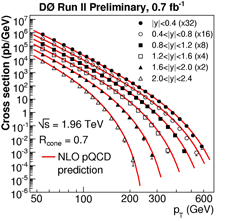
This figure shows the measured rate of inclusive jet production at DZero in six exclusive angular regions. The theoretical predictions are illustrated with red lines. The results are artificially separated by successive factors of two to maintain readability.
If the proton were a freeway, it would hold a wide range of traffic from slow, lumbering trucks to speedy sports cars whizzing along in the fast lane. The proton's constituent partons (quarks and gluons) represent these vehicles and their enormously varying relative momenta. For physicists at the Tevatron, understanding the dynamics of the proton's parton traffic, especially the fastest drivers, is essential to predict the physics of hadron collisions. Fortunately, they can rely on the scientists who patrol the proton's parton freeways.
The proton-antiproton collisions in the Tevatron occur between constituent partons. Physicists can predict the interactions of those partons via quantum chromodynamics. QCD describes the dynamics of the strong force, one of the four fundamental forces of nature. Physicists observe the particles ejected from these parton collisions as collimated sprays of particles (referred to as "jets") measurable via the energy they deposit in the detector. Physicists measuring the rate of jet production as a function of jet energy and relative to the Tevatron beam direction can infer information on the underlying QCD processes responsible for the interactions. By collecting data on a large range of parton momenta, researchers can accurately model the momentum distribution of the parton traffic inside the proton. This measurement relies heavily on a careful understanding of the energies of the jets observed in the detector.
Researchers at the DZero experiment worked hard to systematically refine their jet energy calibrations. Their reward was the most precise measurement of the proton's inclusive jet production rate over the largest kinematic range to date. Using 0.7 inverse femtobarns of data, DZero's measurement of the inclusive jet cross section agrees with modern theoretical calculations over eight orders of magnitude and is precise enough to probe new physics models at the TeV energy scale. Researchers at LHC experiments also will benefit greatly from this new result, as they prepare for proton collisions at energies even higher than at the Tevatron. They will rest in good hands as they rely on DZero's parton patrol to help them navigate the proton's turbulent traffic.
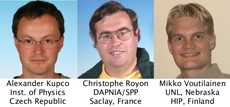
Left to right: Alexander Kupco, Christophe Royon and Mikko Voutilainen made primary contributions to this analysis.
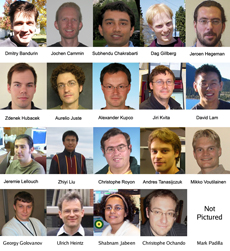
DZero's Jet Energy Scale working group is responsible for establishing the intricate calibration procedure for correctly determining the energy of jets. This effort is essential for nearly all DZero analyses, particularly the one presented here.
Result of the Week Archive
|
DZero reaches data record
Last week, the DZero collaboration reached three inverse femtobarns in
recorded data. "We all look forward to the exciting physics results that
will come from analyzing this large data set, and to adding even more
inverse femtobarns of data in the future," wrote spokespersons Dmitri
Denisov and Darien Wood in an e-mail to their colleagues.
Inverse femtobarn refers to the number of collisions that the
Tevatron collider produced. The milestone reflects the excellent performance
of the Tevatron and the operational efficiency of the DZero experiment.
Since the beginning of Run II, the Tevatron has delivered 3.5 inverse femtobarns to
DZero, and experimenters were able to record 3 inverse femtobarns on tape.
|
|
Have a safe day!
Employee Assistance Program
The January newsletters of the Employee Assistance Program are now available for employees and supervisors. The newsletters provide tips for the new year and information on the Employee Assistance Program, which is provided by VMC Behavioral Healthcare Services. Brian Malinowski, EAP counselor, is at Fermilab on Wednesdays and Fridays, x3591, brianm@fnal.gov. As an employee, you have 24-hour access to assistance, seven days a week by calling 1-800-843-1327.
Brown Bag Seminar Jan. 25
Wellness Works will present a Brown Bag Seminar in Curia II from noon to 1 p.m. on Jan. 25 entitled "Who moved my Cheese" by Preston Harley, M.D.
Pidgin: Secured Onsite Instant Messaging Client course
A course on Pidgin, an instant messaging client supported by the Computing Division, will be offered Feb. 12 and 14. Learn what instant messaging has to offer and how to use Pidgin. Learn more and enroll
International Folk Dancing Thursday
International Folk Dancing will meet Thursday, Jan. 24, with a special workshop on Balkan and Norwegian dance by internationally known teacher Lee Otterholt. Dancing is at Kuhn Barn on the Fermilab site and begins at 7:30 p.m. Newcomers are welcome and you do not need to come with a partner. Call (630)584-0825 or (630)840-8194 or e-mail for more information.
Additional Activities |
|